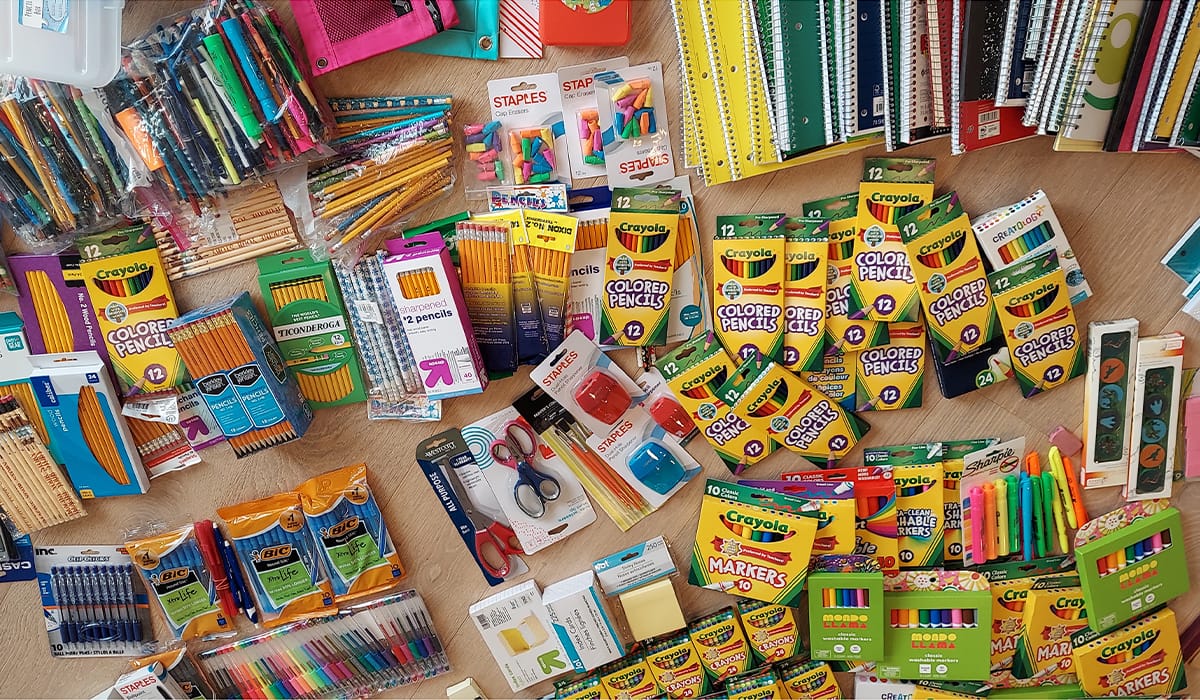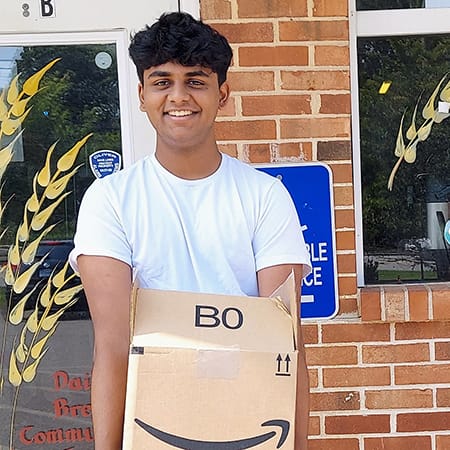Redistributing the School Supply Surplus

Meet Daily Point of Light Award honoree Aadit Bontha. Read his story, and nominate an outstanding volunteer or family as a Daily Point of Light.
Everyone has things in their closet they are no longer using—sweaters they’ve grown out of, books they’ll never read again, a sourdough kit that was wishful thinking at best. Aadit Bontha, a 16-year-old competitive fencer, discovered his extra stuff in the realm of school supplies. Armed with the knowledge that kids who lack things like notepads, pencils or textbooks are more prone to have poor attendance or to drop out of school entirely, Aadit decided to redistribute his surplus—and others’—to kids around the world.
In 2022, before starting high school, he founded School Essentials Drive. Aadit’s mom drove him to pick up and drop off donations before he got his driver’s license, happy to lend a hand to the cause. Partnering with one library for supply drives has expanded to seven, and as the organization’s reach has grown, so have the contributions.
He now also coordinates with his local YMCA and funnels a portion of items through international partners like Develop Africa. Their people on the ground have helped facilitate the donation of nearly 300 pounds of supplies to places in West Africa and Bangladesh. Aadit has even donated part of his summer internship earnings for shipping costs.

What inspires you to volunteer?
I’ve been volunteering for around six years, and I really like making an impact on the community. I feel like I was born with good fortune, but that your economic status shouldn’t impact your future. So I want to help those who need it more than me.
What led you to get started with this initiative?
I had lots of extra school supplies from over the years. I thought that if I had that many, my friends and family members likely would, too. I reached out to a local library, and they agreed to set up a donation drive.
What does your day-to-day look like as the founder of School Essential Drive?
After school, I usually check our email and social media for people requesting to donate or asking about the fund. Then, we drive over to our local libraries or YMCA to see if any donations have been made that day. If we collect enough, we go to the UPS Store to get a shipment label and send those supplies to people who need them.
I reach out to new local libraries periodically to widen our outreach and drive to community shelters, churches, etc. to donate supplies locally. I also run fundraisers at school and among local friends and family to raise money for shipping costs for our international partners.
Did you run into any challenges finding your following?
In the beginning, a lot of people didn’t trust my organization, as I didn’t have my 501(c)(3) status yet. That was the main thing I could work towards to become more trustworthy. Getting that was a pretty big accomplishment for me.
Tell us about the Android app you developed.
I made an app in order to streamline the process for School Essentials, so people could see where they could donate and view our partner locations. It was also to be more transparent. They can see where everything goes and how it works. We have a detailed spreadsheet of past donations and when we donate. It’s another tool for people to learn more about School Essentials and to verify its authenticity. I update it once a week.
I learned to code by watching YouTube videos for the most part. I didn’t really have any experience, though I did have some basic classes in school.
What are your long-term plans or goals for the organization?
Looking ahead, when I’m in college, I want to expand nationally and make a bigger impact. I’m also looking into donating in more countries, like Sri Lanka and the Caribbean, where there’s some economic inequality and social tension. Or places, like Ukraine, currently affected by war.
What’s been the most rewarding part of your work?
It’s seeing people who really have a need for something that I deliver, and that even if it’s a small impact, knowing that I changed their lives for the better in some way. Our shipping providers have contacted us with some handwritten letters and pictures of the kids receiving the items abroad.
What have you learned through your experiences as a volunteer?
It’s really important to connect with people who might know more or who have been volunteering or hosting events longer than me. They’ve given me a lot of valuable information. I’ve also learned to be hands-on and talk to as many recipients as possible.
Additionally, it’s important to advertise on social media and build an app. Those are some of the main drivers of awareness. Without those things, I wouldn’t have been able to make such a big impact, because people wouldn’t have known about the drives.
Why is it important for others to get involved with causes they care about?
I don’t think it’s fair that some people don’t get the same opportunities as other people. If you have the ability to help someone, it’s always best to do it. You can make an impact on their life, and everyone benefits.
Any advice for people who want to start volunteering?
For someone who wants to start their own initiative, the most important thing is talking to a lot of people, because it gives you a lot of new information that you can use to come up with ideas for your initiative. If you’re trying to find an initiative to help, look for opportunities that use your hobbies or interests. Connect with something you already know about doing and help other people out at the same time.
What do you want people to learn from your story?
Anything is possible. Even at a young age, you’re able to start donating and making a big impact on the world. You don’t need to be well-known to start an organization. Anyone can do it.
Do you want to make a difference in your community like Aadit? Find local volunteer opportunities.